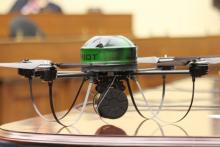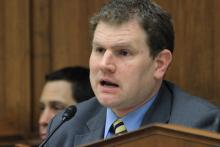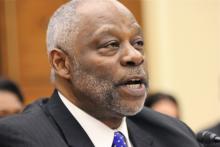
A drone sits on a table in a House hearing room on Feb. 15, 2013. The hearing was focused on the future of drones in U.S. airspace. (CNSNews.com/Penny Starr)
(CNSNews.com) – Experts could not answer questions about privacy concerns related to incorporating unmanned aerial vehicles, (UAV) or drones, into U.S. airspace at a House hearing on Friday.
The House Science, Space and Technology Committee’s Subcommittee on Oversight invited officials from the Federal Aviation Administration, National Aeronautics and Space Administration and the Government Accountability Office to testify on progress the FAA is making with its congressional mandate to integrate drones into the national airspace system (NAS).
The FAA Modernization and Reform Act of 2012 tasked the agency with completing the job by September 2015.

Rep. Dan Maffei (D-N.Y.) asked a panel of experts about privacy concerns being addressed in U.S. drone policies. (CNSNews.com/Penny Starr)
Ranking member Dan Maffei (D-N.Y.) asked panelists about privacy concerns during the hearing, which was chaired by Rep. Paul Broun (R-Ga.).
“The chairman and I both have expressed concerns about privacy and civil liberties,” Maffei said. “Who is responsible for regulating these issues such as privacy concerns?”
“Mr. Maffei, we looked into this, and I think at best we can say is it’s unknown at this point,” Gerald L. Dillingham, director for Civil Aviation Issues at GAO, said. “We did our work.
“We asked FAA about it, and FAA said ‘Our area is safety and that’s what we’re going to focus on,’” Dillingham said, adding that they are already regulations and laws on the books to protect the privacy of U.S. citizens.
But those laws have not been tested as they relate to drones, Dillingham said.

Gerald Dillingham, director of Civil Aviation Issues at the Government Accountability Office, testified at the drone hearing on Feb. 15, 2013. (CNSNews.com/Penny Starr)
Karlin Toner, director of Joint Planning and Development Office at FAA, and Edgar Waggoner, director of Integrated Systems Research Program Office with NASA, did not answer the question.
The FAA posted a draft plan for protecting privacy on its website on Thursday, launched in conjunction with its announcement inviting states to compete to be selected for six drone test sites.
“Along with the test site selection process, the FAA is sending a notice to the Federal Register asking the public to review the draft privacy language and provide comments,” a press release on the plan stated.
“The FAA will consider all comments submitted as it develops the final privacy requirements. These requirements will be included in the agreements between the test sites and the FAA,” the press release added.
Dillingham cited the FAA notice, saying privacy is a major concern going forward with its plans.
“From our perspective that’s one of the big obstacles to integration – that is public acceptance, public education, public concern about how their data will be used,” Dillingham said.
The GAO released a report on drones that included privacy issues in September 2012.
“Stakeholder privacy concerns include the potential for increased amounts of government surveillance using technologies placed on UAS, the collection and use of such data, and potential violations of constitutional Fourth Amendment protections against unreasonable search and seizures,” the GAO report stated.
“Currently, no federal agency has specific statutory responsibility to regulate privacy matters relating to UAS for the entire federal government,” it added.
The Congressional Research Service also addressed privacy in a Jan. 30, 2013 report.
“Perhaps the most contentious issue concerning the introduction of drones into U.S. airspace is the threat that this technology will be used to spy on American citizens,” the report states. “With the ability to house high-powered cameras, infrared sensors, facial recognition technology, and license plate readers, some argue that drones present a substantial privacy risk.”
Last year, Rep. Ed Markey (D-Mass.) introduced H.R. 6676, the Drone Aircraft Privacy and Transparency Act (DAPTA) to amend “the Federal Aviation Administration (FAA) Modernization and Reform Act to include privacy protection provisions relating to data collection and minimization, disclosure, warrant requirements for law enforcement, and enforcement measures in the licensing and operation of ‘unmanned aircraft systems,’ commonly known as drones,” according to his website.
The bill was referred to the House Subcommittee on Commerce, Manufacturing, and Trade.
Source material can be found at this site.









